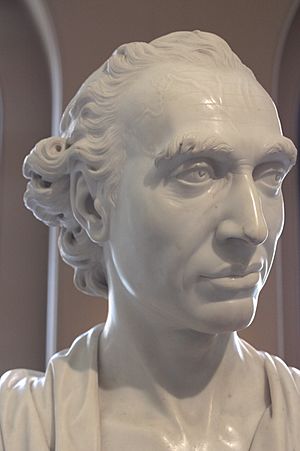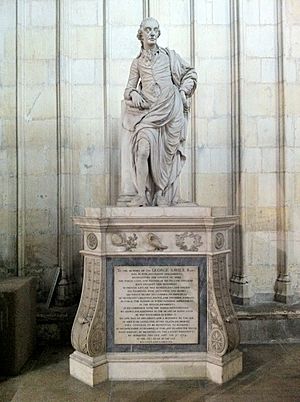Sir George Savile, 8th Baronet facts for kids
Sir George Savile, 8th Baronet of Thornhill (born 18 July 1726 – died 10 January 1784) was an English politician. He served in the House of Commons, which is like the main part of the UK's parliament, from 1759 to 1783. He was known for his fair and open-minded views.
Contents
Early Life and Education
George Savile was born in London at Savile House. He was the only son of Sir George Savile, 7th Baronet, and Lady Savile. His family also had a home called Rufford Abbey in Nottinghamshire. When his father passed away in 1743, George inherited the title of Baronet. He went to college at Queens' College, Cambridge.
Political Career and Beliefs
Sir George Savile became a Member of Parliament for Yorkshire in 1759. He believed in very modern ideas for his time.
- He supported giving more rights to Roman Catholics and Protestants who were not part of the main Church of England.
- He also defended the American colonists during their fight for independence.
One of his most important actions was introducing the Catholic Relief Act in 1778. This law aimed to reduce some of the harsh rules against Catholics. However, this act unfortunately led to the Gordon Riots in 1780, which were a series of protests and disturbances.
Sir George Savile never wanted to hold a high government position. He chose to resign from parliament in 1783. He was also a member of important groups like the Royal Society and the American Philosophical Society.
Personal Life and Legacy
Sir George Savile never married. He passed away in London and was buried in his family's burial place in Thornhill. Many people thought highly of him.
Horace Walpole, a famous writer, said Sir George had a lot of money and an even bigger mind. Edmund Burke, another well-known politician, also respected him greatly.
A statue of Sir George Savile stands in York Minster. Part of the words on it describe him:
- In his private life, he was kind and honest.
- He gave to charity often, but kept it a secret.
- His heart was full of generosity, kindness, fairness, and honesty.
- In public, he supported every national improvement.
- In parliament, he was honest and could not be bought.
- In his dealings with others, he was fair and not selfish.
Family and Inheritance
Sir George Savile left his home, Rufford Abbey, and other properties to his nephew, Richard Lumley. Richard later added Savile to his name. Over time, the Savile estates passed through different family members. One of his relatives, John Savile, became a diplomat and was given the title of Baron Savile of Rufford. He worked for Britain in different countries like Dresden, Bern, and Rome.
See also
 | Valerie Thomas |
 | Frederick McKinley Jones |
 | George Edward Alcorn Jr. |
 | Thomas Mensah |



